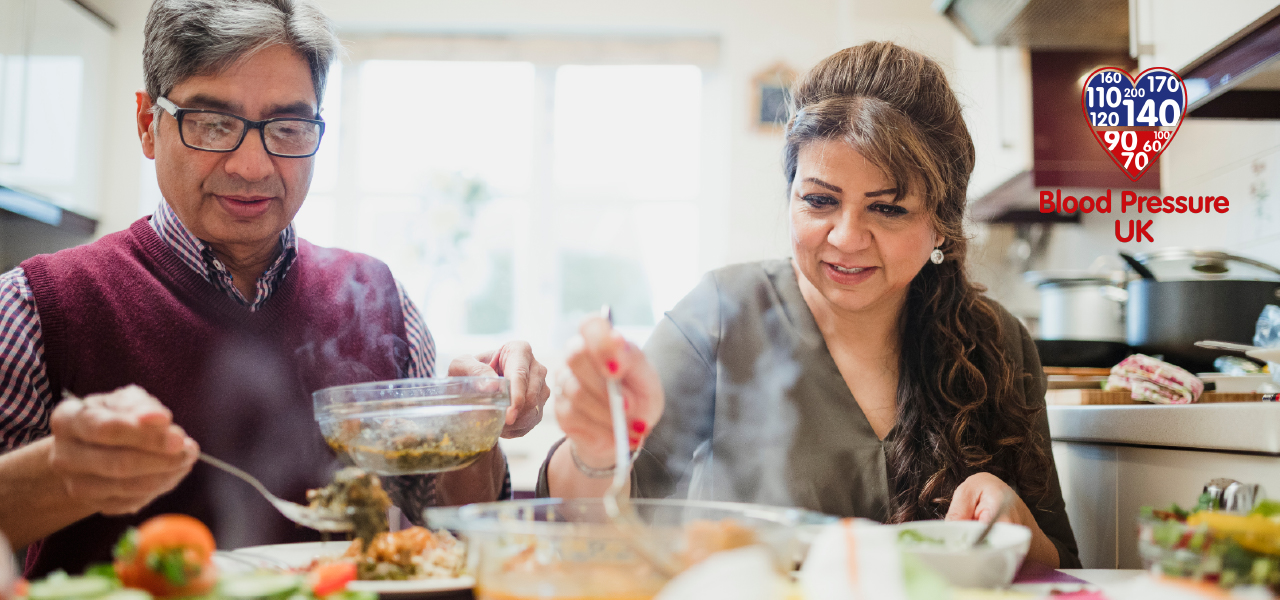10 January 2023

A South Asian Guide to Controlling Your Blood Pressure
Evidence shows that people of South Asian descent are at higher risk of high blood pressure and coronary heart disease (CHD) – with it being predicted that people with South Asian origins, are 30 – 40% more likely to die prematurely from CHD, compared to the average UK population. We asked Blood Pressure UK to advise on what people from South Asian descent can do, to help control their blood pressure…
High blood pressure is the biggest known cause of heart disease and stroke in the UK, both of which can cause serious illness, disability and even premature death. South Asian people in the UK are at much higher risk of dying from heart disease or stroke, meaning that controlling your blood pressure can really help to lower risks of serious health problems. The good news is, for those of South Asian descent, there are some simple ways that high blood pressure can be prevented – such as reducing your salt intake.
But first, what is blood pressure?
When your heart beats, it pumps blood around your body to give it the energy and oxygen it needs. As the blood moves, it pushes against the sides of your blood vessels. The strength of this pushing is your blood pressure. Blood pressure is expressed as two numbers:
- Systolic pressure represents the pressure exerted when your heart beats and
- Diastolic pressure represents the pressure exerted when your heart relaxes between beats
Blood pressure is measured in ‘millimetres of mercury’ (mmHg) and when your blood pressure is measured, it will be written as two numbers with systolic pressure ‘above’ diastolic pressure – for example. 120/80 mmHg or ‘120 over 80’.
Blood pressure is usually not something you feel and the only way to know what your blood pressure is, is to have it measured. So, the next time you have your blood pressure measured, ask what your numbers are and if they are high, make small lifestyle changes that may have a big benefit – such as reducing your salt intake.
Salt and Blood Pressure
Consuming too much salt raises your blood pressure. A high-salt diet disrupts the natural sodium balance in the body. This in turn causes the body to retain water, which increases the pressure of the pushing of blood against the vessel walls and therefore, increasing your blood pressure.
Adults should eat less than 6 grams (about one teaspoon) of salt a day, but most of us eat much more than this. But the good news is, it’s never too late to cut down on salt, and it’s probably easier than many may think…
Tips for reducing your salt intake
- Try to use less salt when cooking, or at the table.
- Try reducing your salt intake little by little, as a gradual reduction is often not even noticeable until you are adding no salt – for example, if you like to eat papadums as a snack or accompaniment, try to limit the number of times you eat them in a week, as they’re high in salt.
- Don’t add salt to rice and paratha, chapatti or poori, as the flavour of curries and pickles will naturally enhance their flavour.
- Swap salt for more of the herbs and spices that you may already use in your cooking – such as dhana jeera (coriander and cumin powder), haldi (turmeric), curry leaves, lemon or lime juice, or others.
- Read food labels – around 80% of the salt we eat is hidden in foods like bread, breakfast cereals, biscuits or processed foods. Spice mixes, sauces, chutneys and pickles can also contain a lot of salt. Always read the labels and choose the options with the least salt.
- Eat plenty of fruit and vegetables as they contain potassium, which helps to keep your blood pressure down – so try adding more veg, pulses and lentils (dahl) to curries and keema. For example, in Chana / Chole (chickpea) add spinach. Or to potato curry, add peas or cauliflower. Also try replacing sweet snacks with fresh or dried fruit.
- Try to vary what fruit and vegetables you eat each day also – fresh, dried, frozen and tinned are all fine, but watch out for added salt and sugar, like salted water in tinned foods and sugar in syrup.
Healthy pressure, healthy heart
There are a number of other risk factors for heart disease and stroke, that people of South Asian origin are at higher risk of – such as diabetes and high cholesterol – so it makes even more sense to control your blood pressure, as it helps your heart and body in more ways than one.
Your blood pressure is very important, no matter your age. Making little changes today, can prevent future issues, and will keep you in good habits. Just remember, it’s never too late to take action to lower your blood pressure. Even small changes can make a big difference, so why not make a start today?
For further information, visit https://www.bloodpressureuk.org/.
